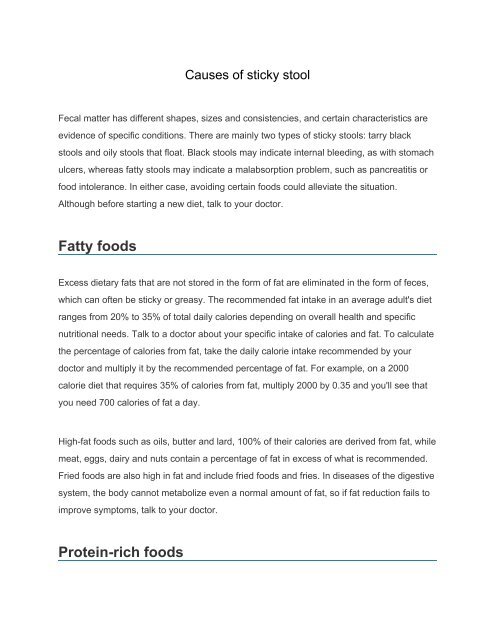Causes of sticky stool
Are you one of those persons who spend a long time in the toilet wiping your butt over and over and just cannot seem to get rid of the sticky stool . You may also find you are a two or three time flusher because your stool just always seem to stick to the toilet bowl, then you may have a sticky poop problem. Visit: http://www.lorecentral.org
Are you one of those persons who spend a long time in the toilet wiping your butt over and over and just cannot seem to get rid of the sticky stool . You may also find you are a two or three time flusher because your stool just always seem to stick to the toilet bowl, then you may have a sticky poop problem. Visit: http://www.lorecentral.org
Create successful ePaper yourself
Turn your PDF publications into a flip-book with our unique Google optimized e-Paper software.
<strong>Causes</strong> <strong>of</strong> <strong>sticky</strong> <strong>stool</strong><br />
Fecal matter has different shapes, sizes and consistencies, and certain characteristics are<br />
evidence <strong>of</strong> specific conditions. There are mainly two types <strong>of</strong> <strong>sticky</strong> <strong>stool</strong>s: tarry black<br />
<strong>stool</strong>s and oily <strong>stool</strong>s that float. Black <strong>stool</strong>s may indicate internal bleeding, as with stomach<br />
ulcers, whereas fatty <strong>stool</strong>s may indicate a malabsorption problem, such as pancreatitis or<br />
food intolerance. In either case, avoiding certain foods could alleviate the situation.<br />
Although before starting a new diet, talk to your doctor.<br />
Fatty foods<br />
Excess dietary fats that are not stored in the form <strong>of</strong> fat are eliminated in the form <strong>of</strong> feces,<br />
which can <strong>of</strong>ten be <strong>sticky</strong> or greasy. The recommended fat intake in an average adult's diet<br />
ranges from 20% to 35% <strong>of</strong> total daily calories depending on overall health and specific<br />
nutritional needs. Talk to a doctor about your specific intake <strong>of</strong> calories and fat. To calculate<br />
the percentage <strong>of</strong> calories from fat, take the daily calorie intake recommended by your<br />
doctor and multiply it by the recommended percentage <strong>of</strong> fat. For example, on a 2000<br />
calorie diet that requires 35% <strong>of</strong> calories from fat, multiply 2000 by 0.35 and you'll see that<br />
you need 700 calories <strong>of</strong> fat a day.<br />
High-fat foods such as oils, butter and lard, 100% <strong>of</strong> their calories are derived from fat, while<br />
meat, eggs, dairy and nuts contain a percentage <strong>of</strong> fat in excess <strong>of</strong> what is recommended.<br />
Fried foods are also high in fat and include fried foods and fries. In diseases <strong>of</strong> the digestive<br />
system, the body cannot metabolize even a normal amount <strong>of</strong> fat, so if fat reduction fails to<br />
improve symptoms, talk to your doctor.<br />
Protein-rich foods
Proteins are digested in the stomach, where with the presence <strong>of</strong> hydrochloric acid it<br />
decomposes into amino acids. The high levels <strong>of</strong> acid needed to digest proteins can<br />
damage the lining <strong>of</strong> the stomach, causing an ulcer and blood to form. Digested blood will<br />
result in tarry black <strong>stool</strong>s. The recommended daily allowance, or RDA, <strong>of</strong> protein is 10 to<br />
35% <strong>of</strong> total calories. As with fat intake, you can calculate the daily calories by the amount<br />
<strong>of</strong> daily protein that the doctor recommends. This will tell you how many calories you need<br />
from a protein source. A diet that includes a lot <strong>of</strong> meat, eggs and dairy products could<br />
exceed the recommended intake and damage the stomach, resulting in <strong>sticky</strong> <strong>stool</strong>.<br />
Food intolerance<br />
Some people who have <strong>sticky</strong> poop can not properly process food nutrients. Foods<br />
containing gluten or lactose may contribute to <strong>sticky</strong> <strong>stool</strong>s in susceptible people, such as<br />
those who suffer from intolerance to some food, such as celiac disease and lactose<br />
intolerance. Gluten is a protein that is present in the grain <strong>of</strong> wheat, barley and rye. Many<br />
packaged foods contain gluten, so read the labels carefully. Lactose is the sugar present in<br />
milk and to a lesser extent in yogurt and cheese. If you suspect that you are intolerant <strong>of</strong><br />
milk or wheat, consider eliminating these foods from your diet and talk to your doctor.<br />
Read more:http://www.lorecentral.org


